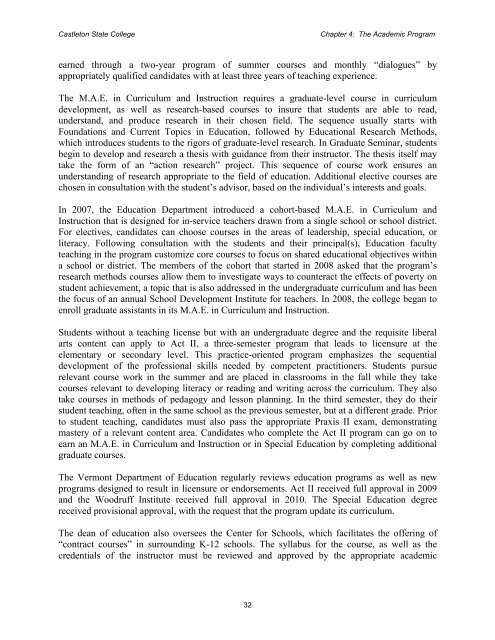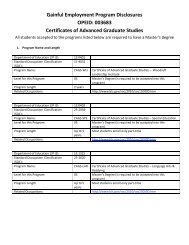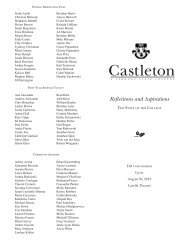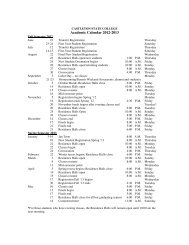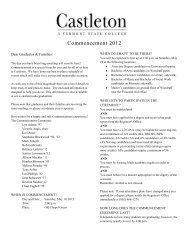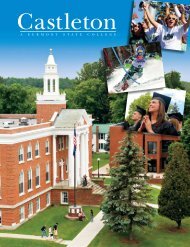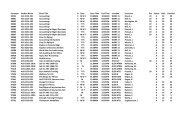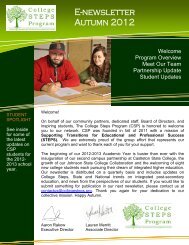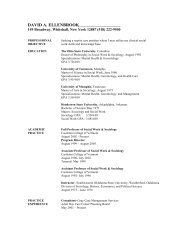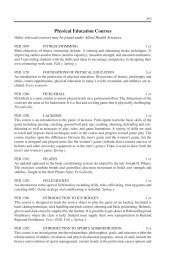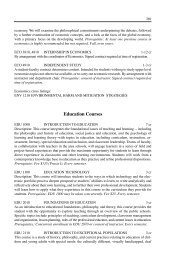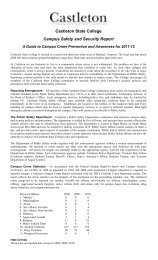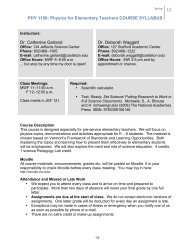Self-study submitted to NEASC, September 2011 - Castleton State ...
Self-study submitted to NEASC, September 2011 - Castleton State ...
Self-study submitted to NEASC, September 2011 - Castleton State ...
Create successful ePaper yourself
Turn your PDF publications into a flip-book with our unique Google optimized e-Paper software.
Castle<strong>to</strong>n <strong>State</strong> CollegeChapter 4: The Academic Programearned through a two-year program of summer courses and monthly “dialogues” byappropriately qualified candidates with at least three years of teaching experience.The M.A.E. in Curriculum and Instruction requires a graduate-level course in curriculumdevelopment, as well as research-based courses <strong>to</strong> insure that students are able <strong>to</strong> read,understand, and produce research in their chosen field. The sequence usually starts withFoundations and Current Topics in Education, followed by Educational Research Methods,which introduces students <strong>to</strong> the rigors of graduate-level research. In Graduate Seminar, studentsbegin <strong>to</strong> develop and research a thesis with guidance from their instruc<strong>to</strong>r. The thesis itself maytake the form of an “action research” project. This sequence of course work ensures anunderstanding of research appropriate <strong>to</strong> the field of education. Additional elective courses arechosen in consultation with the student’s advisor, based on the individual’s interests and goals.In 2007, the Education Department introduced a cohort-based M.A.E. in Curriculum andInstruction that is designed for in-service teachers drawn from a single school or school district.For electives, candidates can choose courses in the areas of leadership, special education, orliteracy. Following consultation with the students and their principal(s), Education facultyteaching in the program cus<strong>to</strong>mize core courses <strong>to</strong> focus on shared educational objectives withina school or district. The members of the cohort that started in 2008 asked that the program’sresearch methods courses allow them <strong>to</strong> investigate ways <strong>to</strong> counteract the effects of poverty onstudent achievement, a <strong>to</strong>pic that is also addressed in the undergraduate curriculum and has beenthe focus of an annual School Development Institute for teachers. In 2008, the college began <strong>to</strong>enroll graduate assistants in its M.A.E. in Curriculum and Instruction.Students without a teaching license but with an undergraduate degree and the requisite liberalarts content can apply <strong>to</strong> Act II, a three-semester program that leads <strong>to</strong> licensure at theelementary or secondary level. This practice-oriented program emphasizes the sequentialdevelopment of the professional skills needed by competent practitioners. Students pursuerelevant course work in the summer and are placed in classrooms in the fall while they takecourses relevant <strong>to</strong> developing literacy or reading and writing across the curriculum. They alsotake courses in methods of pedagogy and lesson planning. In the third semester, they do theirstudent teaching, often in the same school as the previous semester, but at a different grade. Prior<strong>to</strong> student teaching, candidates must also pass the appropriate Praxis II exam, demonstratingmastery of a relevant content area. Candidates who complete the Act II program can go on <strong>to</strong>earn an M.A.E. in Curriculum and Instruction or in Special Education by completing additionalgraduate courses.The Vermont Department of Education regularly reviews education programs as well as newprograms designed <strong>to</strong> result in licensure or endorsements. Act II received full approval in 2009and the Woodruff Institute received full approval in 2010. The Special Education degreereceived provisional approval, with the request that the program update its curriculum.The dean of education also oversees the Center for Schools, which facilitates the offering of“contract courses” in surrounding K-12 schools. The syllabus for the course, as well as thecredentials of the instruc<strong>to</strong>r must be reviewed and approved by the appropriate academic32


